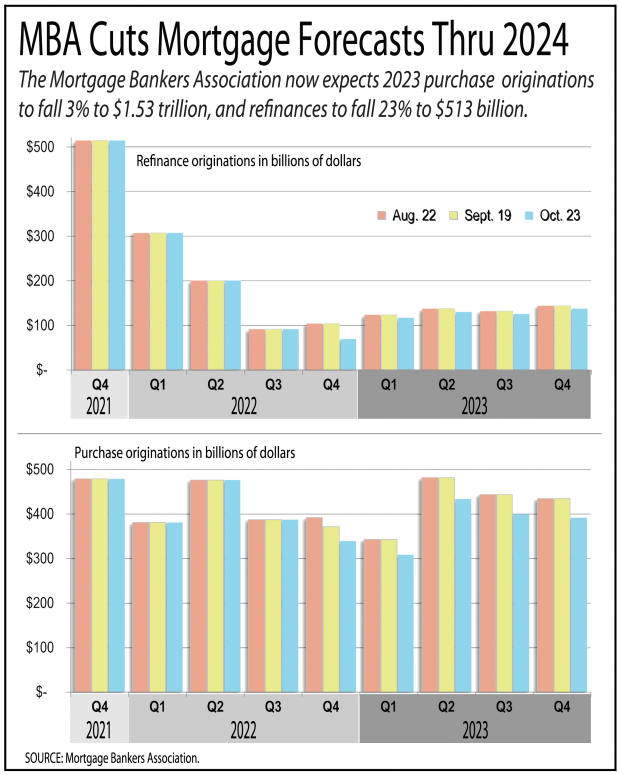MBA cuts its forecasts for originations sharply through 2024.
 Source: AdobeStock.
Source: AdobeStock.
The Mortgage Bankers Association expects a recession early next year that will take a bigger bite out of origination volumes than it expected a month ago and lead to more layoffs by lenders.
MBA cut its forecast by 15% for the fourth quarter and by about 8% over the next two years from its Sept. 19 forecast.
Its forecast, released Sunday at the opening of its annual meeting in Nashville, showed total volume will fall 49% to $2.26 trillion for this year, and fall a further 9% to $2.05 trillion next year before starting to recover in 2024 and 2025.
MBA Chief Economist Mike Fratantoni said MBA is forecasting a recession in the first half of next year “driven by tighter financial conditions, reduced business investment, and slower global growth.”
 Mike Fratantoni
Mike Fratantoni
“Next year will be particularly challenging for the U.S. and global economies,” Fratantoni said. “The sharp increase in interest rates this year – a consequence of the Federal Reserve’s efforts to slow inflation — will lead to an equally sharp slowdown in the economy, matching the downturn that is happening right now in the housing market.”
The unemployment rate will rise from its current rate of 3.5% to 5.5% by the end of the year, and some joining the ranks of the unemployed will be those working for mortgage lenders.

Marina Walsh, MBA’s VP of industry analysis, said more lenders will be losing money this year for the first time since 2018.
As a result, MBA forecasts lenders will cut jobs by 25% to 30% from their peak levels to the trough as their production volumes fall from the record levels of 2020 and 2021. Credit union layoffs attributed to the drop in mortgage lending include 38 jobs on Oct. 6 by Collins Community Credit Union in Cedar Rapids, Iowa ($1.6 billion in assets, 91,034 members as of June 30) and 42 jobs announced in September by GreenState Credit Union in North Liberty, Iowa ($10.7 billion, 385,624 members).
 Marina Walsh
Marina Walsh
“Origination volumes have declined, revenues have dropped, and expenses continue to rise,” Walsh said. “Lenders have started to shrink excess capacity by reducing staffing levels, exiting less profitable channels or exiting the business entirely.”
MBA began cutting its refinance forecasts for 2023 in March and its purchase forecasts for 2023 in May.
Fratantoni said refinance volume is anticipated to decline by 24% to $513 billion next year, and purchase originations will fall 3% to $1.53 trillion because of the recession, continued Fed rate hikes and persistent high buying costs.
However, for those who haven’t lost jobs, home affordability will improve as prices flatten and mortgage rates fall to 5.4% by the end of 2023 after more than doubling to about 7% so far this year.
However, Fratantoni said to expect rates to be volatile in the near-term. One reason will be quantitative tightening by the Fed and other central banks. Other reasons include geopolitical, economic and monetary policy uncertainties.
MBA Deputy Chief Economist Joel Kan said home price growth will fall because of lower sales and higher mortgage rates.
MBA expects half of homes this year will sell for $382,800, up 10% from 2021′s median home price. However, MBA lowered its price expectations over the next two years by 6%. As a result, it now expects prices will fall 2% to $374,200 next year before rising 3% in 2024.
 Joel Kan
Joel Kan
“MBA expects national home prices will be roughly flat in 2023 and 2024, allowing household incomes some much-needed time to catch up to elevated property values,” Kan said. “However, many local markets will see home-price declines, even if national price measures remain largely unchanged.”
While existing homeowners will resist moving to avoid losing their cheap mortgages, leaving more of the purchase market to the bubble of Millennials now in their prime home-buying years, Kan said.
However, he said the still-low levels of for-sale inventory and slowing new construction activity means that housing supply is likely to remain constrained for some time.
But conditions will begin to improve by 2024. Fratantoni said inflation will gradually decline towards the Fed’s 2% target by the middle of 2024.
In 2024 and 2025, MBA forecasts mortgage originations will rise modestly. MBA forecasts total originations will be $2.31 trillion in 2024, which exceeds 2019 volume, but would be well below peaks of $4.11 trillion in 2020 and $4.44 trillion in 2021
Comments
Post a Comment
Please no profanity or political comments.